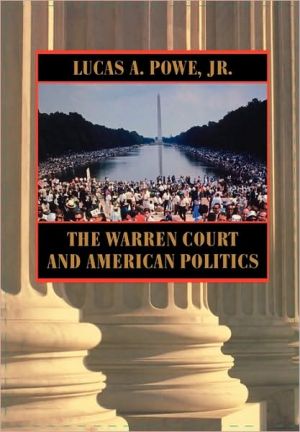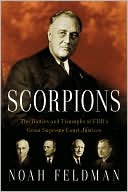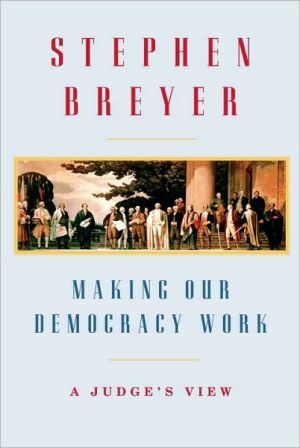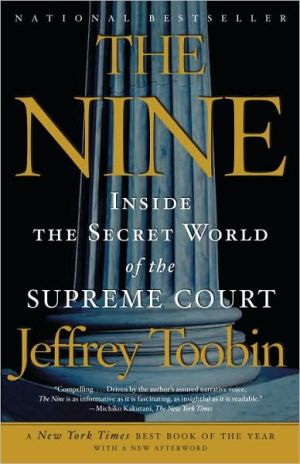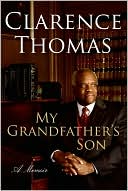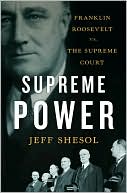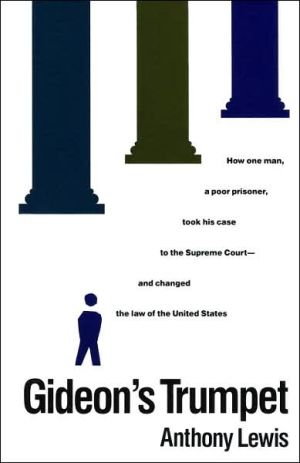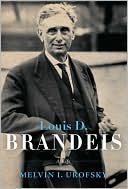Warren Court And American Politics
The Supreme Court under Chief Justice Earl Warren was the most revolutionary and controversial Supreme Court in American history. But in what sense? Challenging the reigning consensus that the Warren Court, fundamentally, was protecting minorities, Lucas A. Powe, Jr. revives the valuable tradition of looking at the Supreme Court in the wide political environment to find the Warren Court a functioning partner in Kennedy–Johnson liberalism. Thus the Court helped to impose national liberal-elite...
Search in google:
The Supreme Court under Chief Justice Earl Warren was the most revolutionary and controversial Supreme Court in American history. But in what sense? Challenging the reigning consensus that the Warren Court, fundamentally, was protecting minorities, Lucas Powe revives the valuable tradition of looking at the Supreme Court in the wide political environment to find the Warren Court a functioning partner in Kennedy-Johnson liberalism. Thus the Court helped to impose national liberal-elite values on groups that were outliers to that tradition—the white South, rural America, and areas of Roman Catholic dominance.In a learned and lively narrative, Powe discusses over 200 significant rulings: the explosive Brown decision, which fundamentally challenged the Southern way of life; reapportionment (one person, one vote), which changed the political balance of American legislatures; the gradual elimination of anti-Communist domestic security programs; the reform of criminal procedures (Mapp, Gideon, Miranda); the ban on school-sponsored prayer; and a new law on pornography. Most of these decisions date from 1962, when those who shaped the dominant ideology of the Warren Court of storied fame gained a fifth secure liberal vote. The Justices of the majority were prominent individuals, brimming with confidence, willing to help shape a revolution and see if it would last. New Republic - Jeffrey Rosen In an important book, Powe argues that the familiar debate about the merits of the Warren Court is..., wrong.
Preface1The Supreme Court, 1935-19531Pt. IBeginnings: The 1953-1956 TermsPrologue: Brown before Warren212Brown273Implementation504Domestic Security755Glimpses of the Future104Pt. IIStalemate: The 1957-1961 TermsPrologue: "Dangerously, Shockingly Close"1276Domestic Security after Red Monday1357Little Rock and Civil Rights1578The Transition179Pt. IIIHistory's Warren Court: The 1962-1968 TermsPrologue: The Fifth Vote2099To the Civil Rights Act21710Revamping the Democratic Process23911After the Civil Rights Act27212Freedom of Expression30313The End of Obscenity?33614Church and State in a Pluralist Society35815Policing the Police37916Policing the Criminal Justice System41217Wealth and Poverty445Pt. IVThe Era EndsPrologue: Retirement46518The Last Year46719What Was the Warren Court?485Chronology503Notes511Bibliography533Index of Cases539General Index549
\ Wall Street JournalMr. Powe describes himself as someone who 'worshipped' the Warren Court. Even so, he portrays it impartially as the super-legislature it often resembled—an outcome-directed body that rarely worried about constitutional theory or precedent… The court set into motion a philosophy of political activism—heedless of constitutional doctrine—that has become, for many judges ever since, almost a way of life. This cannot be a good thing, however much we might applaud some of the Warren court's rulings or the good intentions that lay behind them. Admirably, especially for someone still enthralled by the Warren Court, Mr. Powe seems to recognize this.\ — Jay P. Lefkowitz\ \ \ \ \ \ Jurist: Books-on-Law[Powe's] book would be of considerable interest to students of the judiciary even if its sole virtue were the deftness with which Powe organizes and analyzes the unusually large number of important decisions that the Supreme Court rendered during the controversial tenure of Chief Justice Earl Warren. In this respect, Powe is deserving of comparison to such eminent chroniclers of the Court's history as Henry Abraham, Alfred Kelly, and Winfred Harbison. The book's purpose, however, is as ambitious as its scope… A comprehensive (and accessible) history of the Warren Court.\ — Jeffrey D. Hockett\ \ \ \ The EconomistAn intriguing…history of the path-breaking, even revolutionary, court under Chief Justice Earl Warren in the 1950s and 1960s. Rarely for a constitutional scholar, Powe places the Warren court's most famous cases in their political context…[in] a colorful tale. The liberal Warren court's decisions on race, crime, religion, free speech and obscenity startled, delighted or outraged contemporaries and had a far-reaching impact on American politics and society.\ \ \ \ \ \ New RepublicIn an important book, Lucas A. Powe, Jr. argues that the familiar debate about the merits of the Warren Court is, in fact, wrong. Far from being a group of liberal judicial activists who imposed their views on an unwilling nation, Powe argues, the Warren Court was, for much of its tenure, remarkably deferential to the political branches… Powe persuasively argues that the most important decision of…[the Warren Court] can be justified as an effort to unclog, rather than to thwart, the expression of majority will.\ — Jeffrey Rosen\ \ \ \ \ \ The Journal of American HistoryPurely legal analysis emphasizes the logical links, or absence of them, between the questions raised in two or more cases and the answers given to them. Purely political analysis relies on social history as an explanation for judicial decisions. A more complete picture results, as Powe argues, from a combination of the two Powe has done his non-psychological homework, however, and he presents new material resulting from research about Brennan, Tom Clark, and Douglas he suggests that the Court 'was not worrying about Constitutional theory but rather reaching results that conformed to the values that enjoyed significant national support in the mid-1960s.' His well-researched and lively volume presents strong evidence that he is correct.\ — Philippa Strum\ \ \ \ \ \ Texas Law ReviewThe Warren Court and American Politics is a spectacularly good book. Written for an audience of educated non-lawyers, it provides the best available account of the relationship between the Warren Court's liberalism and American politics during the entire period of Earl Warren's tenure… It retrieves the nearly forgotten period of stalemate. Its argument that the South must be seen at the center of the Warren Court's work in free speech, religion, and criminal procedure illuminates the Court's enterprise better than any other account of which I am aware.\ — Mark V. Tushnet\ \ \ \ \ \ Law and Social InquiryChallenging the reigning consensus that the Warren Court fundamentally protected minorities, this book examines the Supreme Court in a wider political environment. Powe argues that the Court was a functioning partner in Kennedy–Johnson liberalism and thus helped impose national liberal-elite values on groups that were outliers to that tradition.\ \ \ \ \ \ BooklistA thorough and enlightening [read].\ — Mary Carroll\ \ \ \ \ \ Journal of American HistoryPurely legal analysis emphasizes the logical links, or absence of them, between the questions raised in two or more cases and the answers given to them. Purely political analysis relies on social history as an explanation for judicial decisions. A more complete picture results, as Powe argues, from a combination of the two… Powe has done his non-psychological homework, however, and he presents new material resulting from research about Brennan, Tom Clark, and Douglas…he suggests that the Court 'was not worrying about Constitutional theory but rather reaching results that conformed to the values that enjoyed significant national support in the mid-1960s.' His well-researched and lively volume presents strong evidence that he is correct.\ — Philippa Strum\ \ \ \ \ \ Wall Street JournalMr. Powe describes himself as someone who 'worshipped' the Warren Court. Even so, he portrays it impartially as the super-legislature it often resembled--an outcome-directed body that rarely worried about constitutional theory or precedent...The court set into motion a philosophy of political activism--heedless of constitutional doctrine--that has become, for many judges ever since, almost a way of life. This cannot be a good thing, however much we might applaud some of the Warren court's rulings or the good intentions that lay behind them. Admirably, especially for someone still enthralled by the Warren Court, Mr. Powe seems to recognize this.\ — Jay P. Lefkowitz\ \ \ \ \ BooklistA thorough and enlightening [read].\ — Mary Carroll\ \ \ \ \ The EconomistAn intriguing...history of the path-breaking, even revolutionary, court under Chief Justice Earl Warren in the 1950s and 1960s. Rarely for a constitutional scholar, Powe places the Warren court's most famous cases in their political context...[in] a colorful tale. The liberal Warren court's decisions on race, crime, religion, free speech and obscenity startled, delighted or outraged contemporaries and had a far-reaching impact on American politics and society.\ \ \ \ \ New RepublicIn an important book, Lucas A. Powe, Jr. argues that the familiar debate about the merits of the Warren Court is, in fact, wrong. Far from being a group of liberal judicial activists who imposed their views on an unwilling nation, Powe argues, the Warren Court was, for much of its tenure, remarkably deferential to the political branches...Powe persuasively argues that the most important decision of...[the Warren Court] can be justified as an effort to unclog, rather than to thwart, the expression of majority will.\ — Jeffrey Rosen\ \ \ \ \ Law and Social InquiryChallenging the reigning consensus that the Warren Court fundamentally protected minorities, this book examines the Supreme Court in a wider political environment. Powe argues that the Court was a functioning partner in Kennedy-Johnson liberalism and thus helped impose national liberal-elite values on groups that were outliers to that tradition.\ \ \ \ \ Texas Law ReviewThe Warren Court and American Politics is a spectacularly good book. Written for an audience of educated non-lawyers, it provides the best available account of the relationship between the Warren Court's liberalism and American politics during the entire period of Earl Warren's tenure It retrieves the nearly forgotten period of stalemate. Its argument that the South must be seen at the center of the Warren Court's work in free speech, religion, and criminal procedure illuminates the Court's enterprise better than any other account of which I am aware.\ — Mark V. Tushnet\ \ \ \ \ The Journal of American HistoryPurely legal analysis emphasizes the logical links, or absence of them, between the questions raised in two or more cases and the answers given to them. Purely political analysis relies on social history as an explanation for judicial decisions. A more complete picture results, as Powe argues, from a combination of the two Powe has done his non-psychological homework, however, and he presents new material resulting from research about Brennan, Tom Clark, and Douglas he suggests that the Court 'was not worrying about Constitutional theory but rather reaching results that conformed to the values that enjoyed significant national support in the mid-1960s.' His well-researched and lively volume presents strong evidence that he is correct.\ — Philippa Strum\ \ \ \ \ Jurist: Books-on-Law[Powe's] book would be of considerable interest to students of the judiciary even if its sole virtue were the deftness with which Powe organizes and analyzes the unusually large number of important decisions that the Supreme Court rendered during the controversial tenure of Chief Justice Earl Warren. In this respect, Powe is deserving of comparison to such eminent chroniclers of the Court's history as Henry Abraham, Alfred Kelly, and Winfred Harbison. The book's purpose, however, is as ambitious as its scope...A comprehensive (and accessible) history of the Warren Court.\ — Jeffrey D. Hockett\ \ \ \ \ EconomistAn intriguing...history of the path-breaking, even revolutionary, court under Chief Justice Earl Warren in the 1950s and 1960s.\ \ \ \ \ Jeffrey RosenIn an important book, Powe argues that the familiar debate about the merits of the Warren Court is..., wrong. \ —New Republic\ \ \ \ \ Publishers Weekly\ - Publisher's Weekly\ Powe's introduction proclaims a dual purpose: first, "to help revive a valuable tradition of discussing the Supreme Court in the context of American politics"; second, "to replace stereotypes with information" that he has synthesized from a wide range of sources on the Warren court. The book's structure--four chronological parts divided into thematic chapters (civil rights, domestic security, democratic representation, church/state, press freedom, obscenity, police and criminal justice procedures, wealth and poverty)--is intelligently conceived to deal with the more than 200 decisions discussed, but the results fall short of both goals. The bulk of the book consists of too-short case summaries, including background, appeals process, decisions, concurrences and dissents, with little attempt (until the final chapter) at providing analytic unity to the material; accounts of political context are only occasionally striking, more usually superficial. Despite his proclaimed neutrality on the court's decisions (aside from Brown), University of Texas law professor Powe fails to offer satisfying analysis of either Warren's supporters or his critics (and those to the justice's left barely register at all). The result is a contradictory portrait of the court as arbitrary, arrogant and dogmatic, even though Powe offers examples showing that the nine justices did not march in lockstep. The additional failure to consider much earlier cases (Dred Scott, Plessy v. Ferguson) that were far-reaching in their effects further reinforces the highly debatable picture of the Warren court as uniquely arbitrary, rather than simply uniquely liberal. Photos not seen by PW. (Mar.) Copyright 2000 Cahners Business Information.\|\ \ \ \ \ Philip SeibPowe has written an appraisal of the Warren Court that is splendidly encyclopedic in breadth and splendidly nonencyclopedic in writing style. He is not shy about offering his own opinions, and this learned and lively history is sure to inspire controversy as well as admiration. \ — Dallas Morning News\ \
